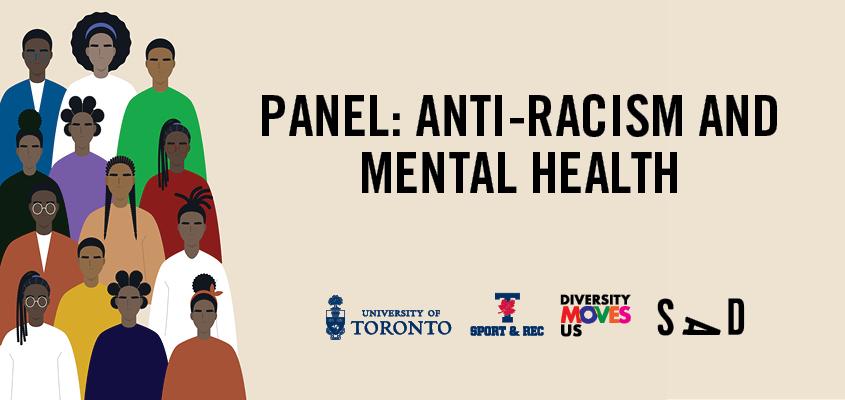
This panel discussion will unpack ways to stay mentally well and resilient during the fight against anti-Blackness and racism.
Panelists will discuss how mental health differs in the communities they work with, and offer meaningful suggestions for support and healing.
This panel is presented in partnership with U of T Sport & Rec and the Toronto SAD Collective. Meghan Yuri Young, co-founder of the SAD Collective will be moderating the discussion.
Q&A - A Q&A will take place after the discussion. If you have questions for the panelists on anti-racism and mental health, please submit them to edib.sportandrec@utoronto.ca. We will also be monitoring the chat during the panel and will accept questions from the chat directly related to the discussion for the Q&A.
Registration is closed.
Registration closed July 6th at 7:30 p.m. when we reached our online hosting capacity of 500 people. Registrants will receive an email with a link to the Zoom webinar on the morning of the event.Thank you, and we look forward to engaging with you in this important discussion.
Panelists include:
Natacha Pennycooke: Natacha is a registered Psychotherapist (CRPO) who works from an anti-oppressive, healing focused, trauma-informed and anti-Black racism lens, to unpack and challenge euro-centric practices that have been central to the generational traumas of racialized communities. She provides individualized psychotherapy, consults on child welfare cases, and facilitates mental health programming for community youth with Keep6ix. Natacha is also the vice-chair of the inaugural Toronto Chapter of the Association of Black Psychologist (ABPsi), and a member of the Canadian Psychological Association (CPA).
Dr. Suzanne Stewart: Suzanne is a member of the Yellowknife Dene First Nation. She is Director of the Waakebiness-Bryce Institute for Indigenous Health, and a registered psychologist and an associate professor of Indigenous healing in clinical counselling psychology at the Ontario Institute for Studies in Education. She is considered one of the world’s leading scholars in Indigenous knowledge and mental health and is committed to advancing Indigenous healing issues through research and policy change. She is also Chair of the Aboriginal Section of the Canadian Psychology Association (CPA) and is committed to advancing Indigenous healing issues through the discipline of psychology.
Emillie Nguyen: Emillie is a prevention and promotion worker at HongFook Mental Health Association, a community organization in Toronto. HongFook works with Asian communities to keep people mentally healthy and manage mental illness from recovery to wellness, through promotion and prevention, treatment, capacity building and advocacy.
Punita Lumb: Punita is a higher education professional specializing in equity, diversity and inclusion. As a skilled strategist, research analyst and coordinator, Punita has led a variety of published and award winning research projects in higher education institutions such as Muslim Perspectives on Racism and Equitable Practice in Canadian Universities. Currently, she coordinates equity based experiential education programs for the Multi-Faith Centre at the University of Toronto, assisting students navigating faith and student life on campus.
Asante Haughton: Asante Haughton is a leader in mental health. A veteran of the speaker circuit, Asante has presented across the globe, including a pair of TEDx talks telling stories detailing how family trauma impact mental health. Through his work, Asante was also named as a CAMH 150 Difference Maker, being awarded the distinction of being one of the top 150 difference makers in Canadian mental health. He seeks to amplify the myriad experiences of Blackness across the diaspora in order to shed light on the ways in which being Black in a world that seeks to diminish Blackness impacts the mental health of Black people.